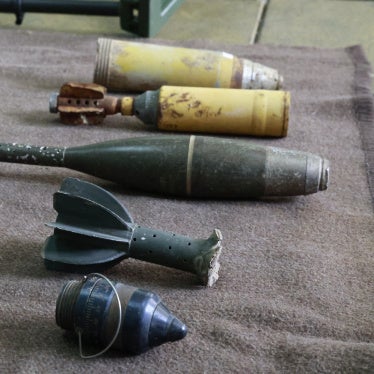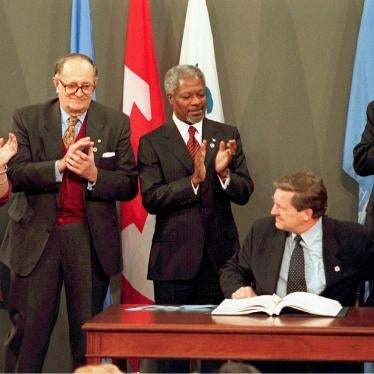Among the clearest provisions of the Convention on Cluster Munitions are its prohibitions on use, production, transfer, and stockpiling. Equally clear in Article 1 is that the convention prohibits assistance to anyone with any prohibited activities under any circumstances. Nevertheless, the prohibition on assistance has led to questions about four key issues: interoperability, transit, foreign stockpiling, and investment. CMC calls on states to interpret the convention to comprehensively ban assistance in order to meet the goal of protecting civilians from the suffering caused by cluster munitions.
Interoperability, which refers to how the convention applies during joint military operations with states not party, has been the most contentious issue of interpretation. Some elements of Article 21 on relations with states not party are undisputed. Article 21(1) and (2) clearly require states to work for universalization, promote the norms of the convention, and discourage use of cluster munitions. In addition, there is general agreement that, under paragraph 3, states parties may participate in joint military operations with states not party. There have, however, been conflicting interpretations of the interoperability provisions since adoption of the convention.
Some states have argued that Article 21 creates an exception to the prohibition on assistance. CMC and most states that have expressed views on this issue find this interpretation to be flawed. Article 21 does not say that states parties may commit prohibited acts in joint military operations; it says simply that participation is allowed. In addition, allowing such an exception to the convention’s prohibitions would violate the object and purpose of the convention—to eliminate cluster munitions and the harm they cause. Finally, if Article 21 were understood to allow states parties to assist with cluster munition use, it would be internally inconsistent. An article cannot logically both require states parties to discourage use (as it does in paragraph 2) and allow them to encourage use (as some states argue it does).
CMC believes Article 21 is best understood as a clarification not an exception. In other words, the article does not create an exception to the convention’s prohibitions but instead clarifies that participation in joint military operations is permissible. The prohibition on assistance applies, as the convention says, “under any circumstances,” including during joint operations.
To date, according to a Cluster Munition Monitor fact sheet available this week, at least 17 states, including four this year, have expressed their agreement with this position in legislation and policy statements. This represents the vast majority of those states that have spoken publicly on interoperability.
The fact sheet also identifies eight states as having ambiguous stances: Belgium, France, Montenegro, the Netherlands, New Zealand, Portugal, Sweden, and Switzerland. It lists three states with interpretations contrary to the predominant view: Australia, Canada, and the United Kingdom. CMC calls on these states to strengthen their interpretations of the prohibition on assistance in a public forum.
The second key interpretive issue relates to transit, that is, movement of cluster munitions across a state party’s territory or through its airspace or territorial waters. Transit represents a form of assistance because it facilitates use and transfer. It should therefore be understood as prohibited. If understood otherwise, a plane could fly through a state party’s airspace on its way to drop cluster bombs.
A third interpretive issue is foreign stockpiling, the stockpiling of cluster munitions by a state not party on territory under a state party’s jurisdiction and control. Like transit, hosting of foreign stockpiles is a form of assistance; it facilitates, in this case, stockpiling and potentially use. States should therefore understand it as prohibited.
Many states have stated that they view transit and/or foreign stockpiling to be banned. In 2011 alone, nine states publicly supported this position on transit, and six on foreign stockpiling. In previous years, 15 states expressed similar views.
Finally, CMC understands the ban on assistance to prohibit investment in production of cluster munitions or their components. Five states have adopted legislation that explicitly prohibits investment, and 19 states have stated that they interpret the convention in a similar way. In several countries, parliamentary initiatives are going on, and financial institutions are taking steps to disinvest from cluster munition producers. We encourage other states to make it clear investment should be banned.
Strong interpretations of these issues—interoperability, transit, foreign stockpiling, and investment—are essential to achieving the humanitarian objective of the convention. States should adopt implementation legislation and articulate national positions that reflect these interpretations. Only by doing so, can they fulfill the convention’s goal of bringing an end to the scourge of cluster munitions.
Thank you.








